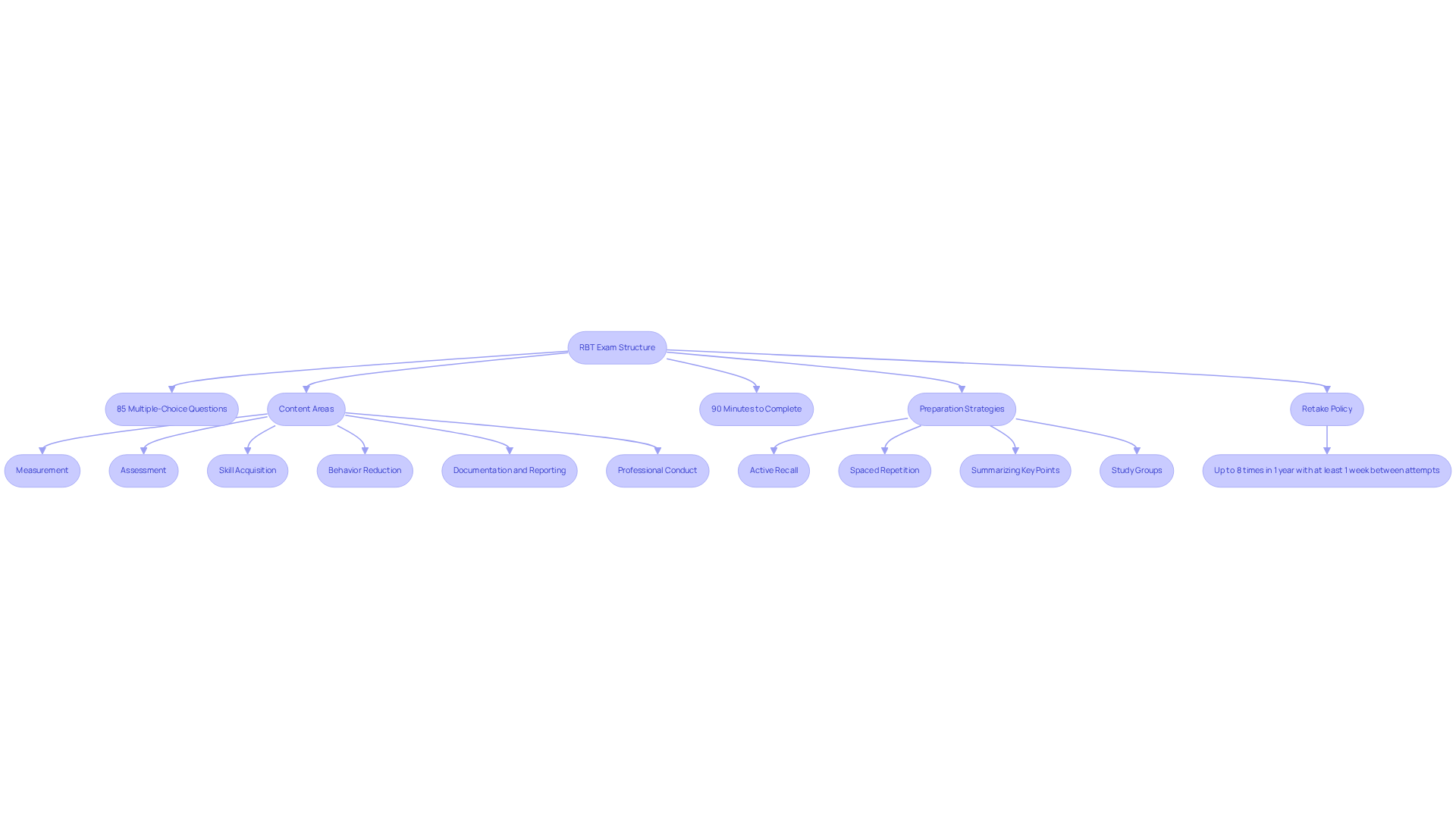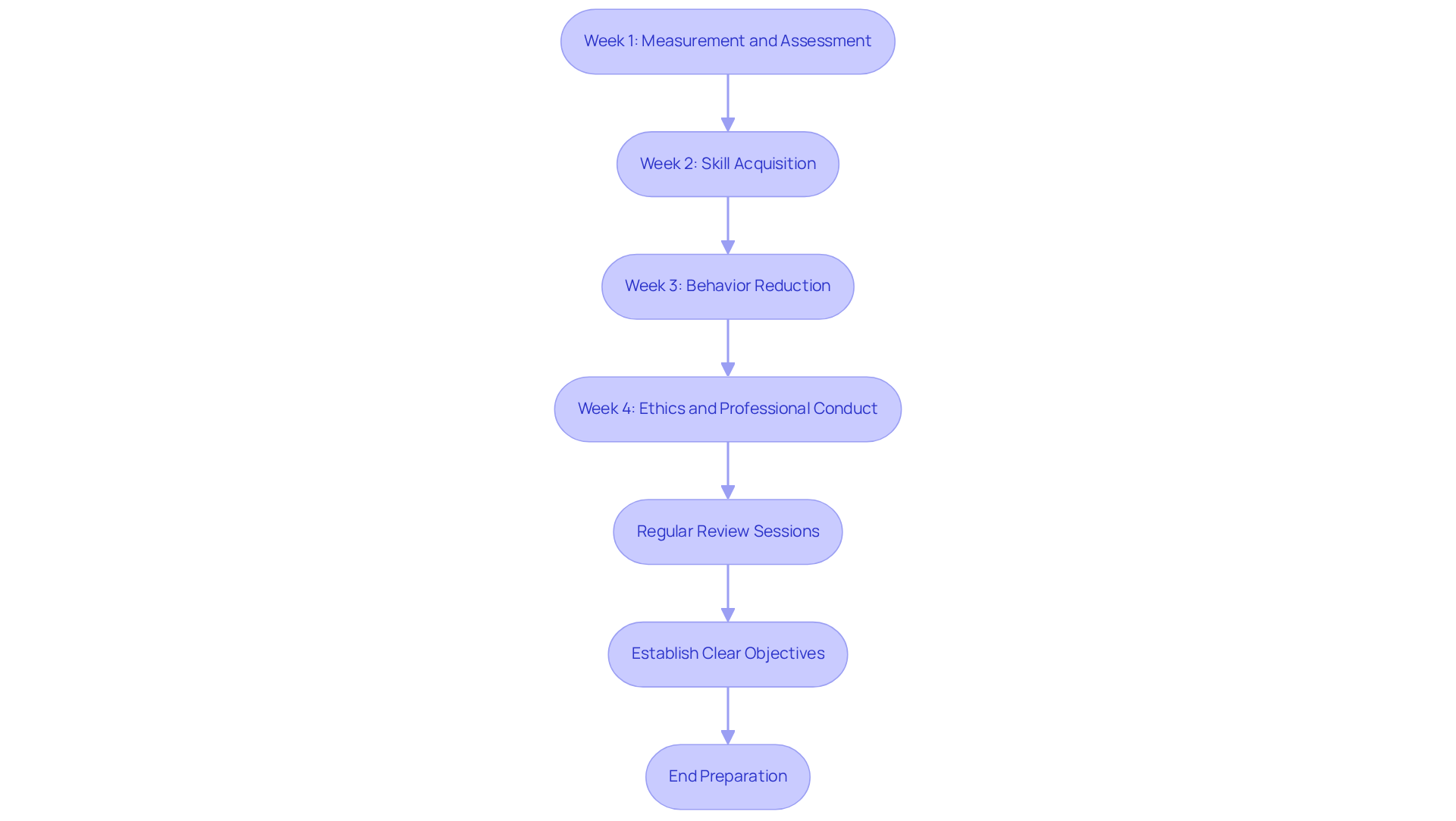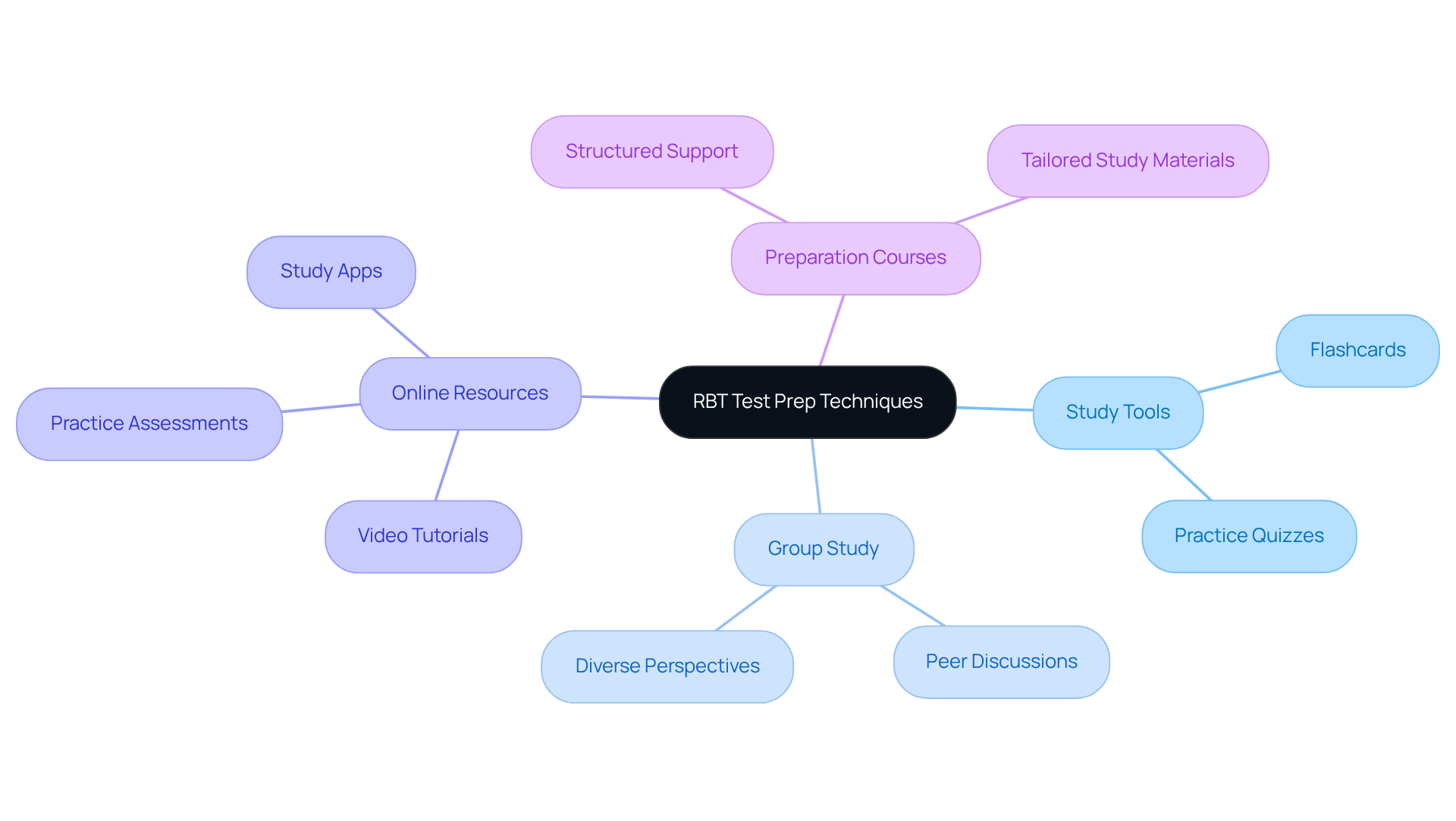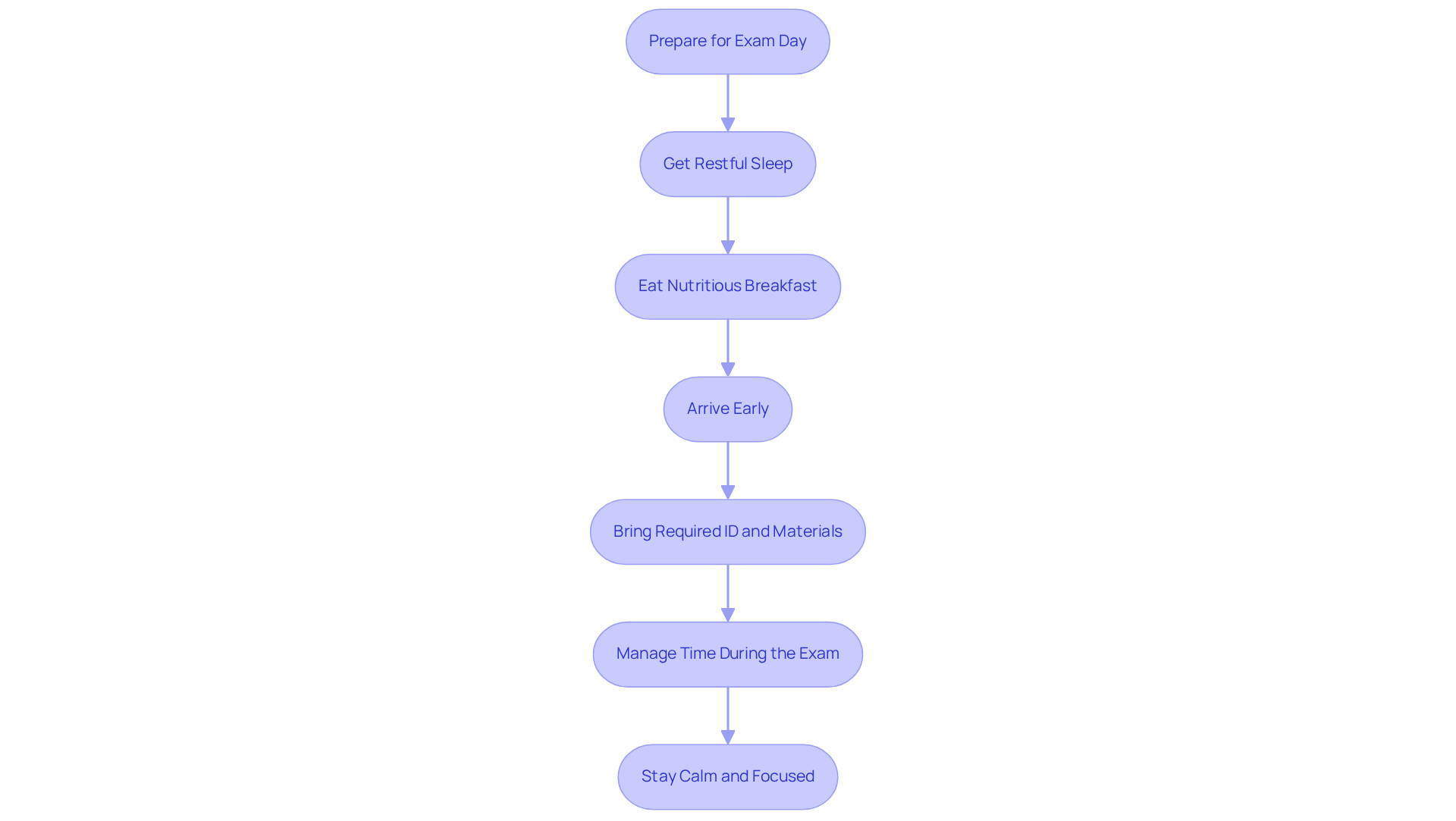August 29, 2025

The article provides a comprehensive guide for preparing for the RBT (Registered Behavior Technician) exam, emphasizing its critical structure and study strategies. Understanding the exam format is essential for success.
Effective study techniques, such as active recall and spaced repetition, are vital for retention and mastery of the material. Furthermore, managing time efficiently on exam day is crucial, especially given the recent decline in pass rates. By focusing on these strategies, candidates can significantly improve their chances of success.
In the competitive landscape of behavior analysis, aspiring Registered Behavior Technicians (RBTs) encounter a formidable challenge: mastering the RBT exam. With pass rates declining alarmingly, the necessity for effective preparation has reached unprecedented levels. This guide presents a comprehensive roadmap designed not only to elucidate the exam structure but also to cultivate tailored study strategies that enhance retention and bolster confidence.
How can candidates revolutionize their study habits to secure success on test day and beyond?
The [RBT assessment](https://hireaba.today) comprises 85 multiple-choice questions, of which 75 contribute to the final score, while 10 serve as unscored pilot questions. Candidates are granted 90 minutes to complete this assessment, which is organized into six fundamental content areas:
Mastery of the RBT Task List is essential, as it outlines the key concepts and skills required for success in this field.
Understanding the assessment's structure, which is , along with its content areas allows for strategic allocation of preparation time, enabling a focused approach on the most critical subjects. Recent trends indicate a concerning decline in pass rates for the RBT assessment, with first-attempt pass rates dropping from 87% in 2019 to 74% in 2023. This underscores the importance of thorough preparation and effective learning strategies for RBT test prep.
Engaging in active learning methods such as:
can significantly bolster retention and understanding of the material, which is crucial for effective RBT test prep. Furthermore, candidates should note that the RBT assessment employs a scaled score range of 0 to 250, with a minimum passing score set at 200. The BACB allows candidates to retake the assessment up to eight times within one year, with at least one week between attempts, providing opportunities for those who may not succeed on their initial try.

To effectively prepare for the [RBT test prep](https://hireaba.today), evaluate the time remaining until your assessment date. Break down your learning materials according to the RBT Task List, which outlines essential competencies. Allocate specific time blocks each week to focus on different content areas, ensuring comprehensive coverage of all topics. For instance:
Incorporate regular review sessions to reinforce understanding and retention of the material. Establishing clear, attainable objectives for each learning session is essential. Individuals who create organized timetables and strive for at least 80% on practice assessments significantly improve their likelihood of success. Statistics suggest that the majority of applicants engage in for 1-3 months prior to sitting for the RBT test, with many gaining advantages from 3-6 weeks of regular preparation. As one successful candidate noted, 'Creating a study schedule and sticking to it made all the difference in my preparation.'
Moreover, while 70-80% of candidates succeed on their initial attempt, the secret to achievement in RBT test prep rests in preparation, knowledge of the task list, and efficient test strategies. Remember, the RBT assessment comprises 85 multiple-choice items, so efficient time management during the test is crucial to ensure you can respond to all items.

To excel in RBT test prep, it is essential to incorporate a variety of engaging and efficient learning techniques. The RBT assessment consists of 85 multiple-choice questions, with 75 counted and 10 designated as practice questions, all to be completed within a 90-minute timeframe.
Notably, the average pass rate for first-time RBT candidates ranges from 70% to 80%, underscoring the importance of effective preparation strategies.
Remember, completing a 40-hour [RBT training course](https://hireaba.today) is a critical prerequisite before attempting the assessment. Regularly evaluate your progress and adapt your learning methods to address any areas of difficulty, ensuring a comprehensive preparation strategy that aligns with your learning style.

On the day of the RBT assessment, prioritize a restful night's sleep and a nutritious breakfast to ensure optimal energy levels. Arriving early at the testing center allows you to check in smoothly and acclimate to the environment, thereby reducing pre-exam anxiety. Remember to bring two forms of identification, including a government-issued photo ID, along with any materials indicated by the testing center, such as study guides or practice assessments.
The RBT assessment comprises , making efficient time management essential. Begin with the questions you find simplest to enhance your confidence, and note any difficult questions for review later. Staying calm and focused is crucial—remind yourself of your thorough preparation and capability to succeed. As one behavior analyst observes, "Handling anxiety on test day is crucial; practice relaxation techniques to sustain composure." Another emphasizes, "Preparation is key."
Real-world experiences from candidates highlight the importance of a positive mindset and preparation, reinforcing that a well-structured approach can lead to success. Aim for the ideal pass rate of 70-80% for first-time test takers, equipping yourself with the right mindset and strategies to navigate exam day effectively.

Mastering the RBT exam is not merely a task; it requires a strategic approach to preparation. Understanding the exam structure, developing a comprehensive study plan, and utilizing effective study techniques are paramount. By recognizing the key content areas and the significance of the RBT Task List, candidates can concentrate their efforts on mastering essential competencies, which significantly increases their likelihood of success.
Throughout this guide, various strategies have been highlighted. Engaging in active learning methods, creating organized study schedules, and leveraging diverse resources such as flashcards and online practice quizzes are all essential components of effective preparation. Moreover, the importance of managing time efficiently during the exam and maintaining a positive mindset on test day cannot be overstated. These elements are crucial for helping candidates navigate the challenges of the RBT assessment.
Ultimately, thorough preparation is vital for achieving a passing score on the RBT exam. By implementing the strategies outlined herein, candidates can approach the exam with confidence and clarity. Embracing a proactive mindset and committing to a structured study regimen will not only enhance understanding but also empower individuals to excel in their pursuit of RBT certification.
What is the structure of the RBT exam?
The RBT exam consists of 85 multiple-choice questions, with 75 contributing to the final score and 10 serving as unscored pilot questions. Candidates have 90 minutes to complete the assessment.
What are the content areas covered in the RBT exam?
The RBT exam is organized into six fundamental content areas: Measurement, Assessment, Skill Acquisition, Behavior Reduction, Documentation and Reporting, and Professional Conduct.
Why is mastery of the RBT Task List important?
Mastery of the RBT Task List is essential as it outlines the key concepts and skills required for success in the RBT field.
What recent trends have been observed in RBT exam pass rates?
There has been a concerning decline in pass rates for the RBT assessment, with first-attempt pass rates dropping from 87% in 2019 to 74% in 2023.
What strategies can improve preparation for the RBT exam?
Effective preparation strategies include engaging in active learning methods such as active recall, spaced repetition, summarizing key points, and participating in study groups.
What is the scoring system for the RBT assessment?
The RBT assessment employs a scaled score range of 0 to 250, with a minimum passing score set at 200.
How many times can candidates retake the RBT assessment?
Candidates are allowed to retake the RBT assessment up to eight times within one year, with at least one week between attempts.
Our expert recruitment strategies and AI-driven sourcing ensure that you receive top-notch candidates quickly, without compromising on quality. Whether you’re looking for BCBAs, Clinical Directors, or RBTs, we’ve got you covered.